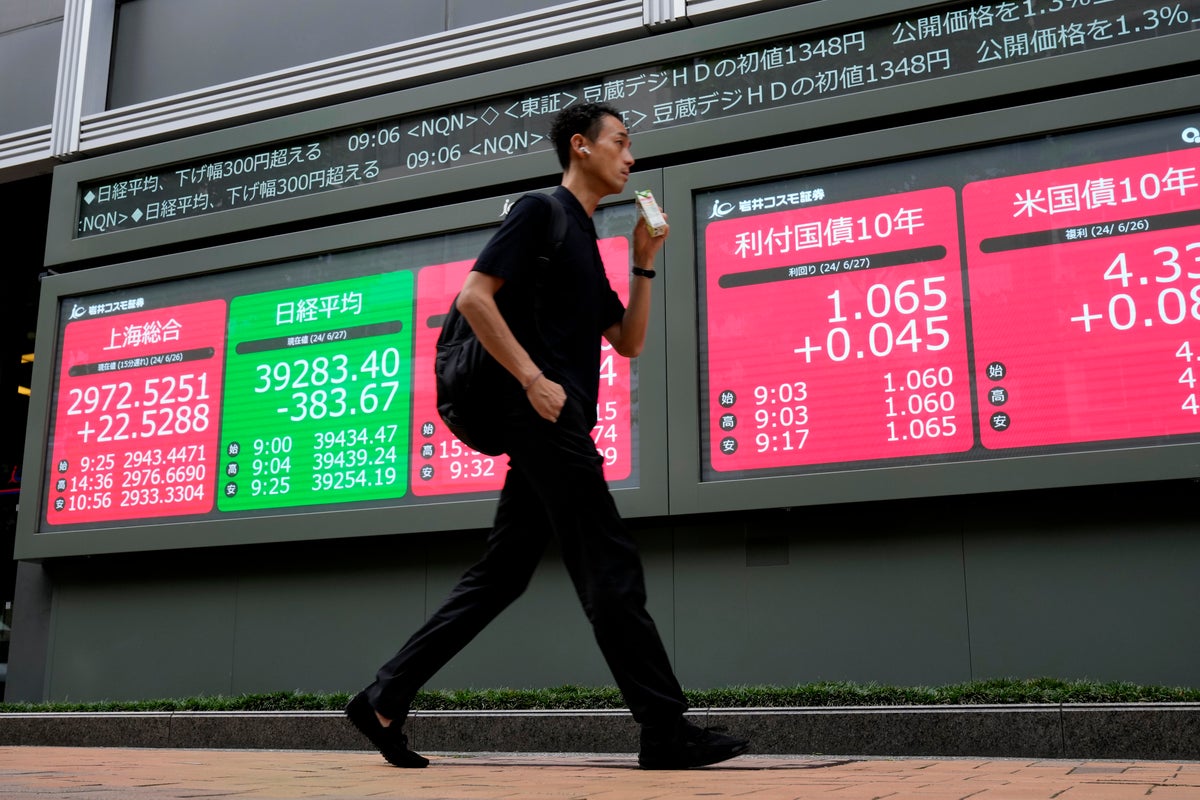
Support truly
independent journalism
Asian shares were mostly lower on Friday after solid gains in Europe overnight, while U.S. markets were closed for the July 4th holiday.
Japan’s benchmark Nikkei 225 topped 41,000 early Friday but then fell back from Thursday’s record close of 40,913.65. U.S. futures edged higher and oil prices fell.
The U.S. government will give its comprehensive update about how many workers employers added to their payrolls during June. Traders are watching such numbers closely in hopes that they will show the economy is slowing enough to prove that inflation is under control, but not so much that it will tip into recession.
That would raise the likelihood of the Federal Reserve cutting interest rates that it has been keeping at two-decade highs, which would alleviate pressure on the economy by making borrowing less costly.
The jobs report is expected to show that employers added 190,000 jobs — a solid gain, though down from a robust 272,000 in May.
“The upcoming June jobs report will play a crucial role in shaping expectations for near-term Federal Reserve rate cuts. Markets currently anticipate a reasonable chance of two rate cuts this year, contrasting with the Fed’s median forecast of just one reduction in 2024,” Anderson Alves of Activ Trades said in a commentary.
In Asian trading early Friday, the Nikkei 225 edged 0.2% lower to 40,843.90 after the government reported higher prices dented consumer sentiment more than expected in May, with household spending falling 1.8%.
Chinese markets were markedly weaker, with Hong Kong's Hang Seng down 1.1% at 17,823.67 and the Shanghai Composite index giving up 0.9% to 2,929.98. The Shanghai benchmark has been trading near its lowest levels since February.
The Kospi in Seoul jumped 1.3% to 2,860.26 after Samsung Electronics forecast that its operating profit in the second quarter will balloon more than 15 times from a year earlier to 10.4 trillion won ($7.52 billion).
Like Nvidia, Taiwan's TSMC, Tokyo Electron and other computer chip makers, Samsung is benefiting from a rebound in the semiconductor industry as applications using artificial intelligence take off.
Elsewhere in the region, Australia's S&P/ASX 200 slipped 0.2% to 7,820.20. Taiwan's Taiex edged 0.1% higher and the SET in Bangkok was up 0.2%.
With U.S. markets closed on Thursday, attention was focused on Britain, where the future for the FTSE 100 was up 0.2% early Friday as an exit poll and partial returns indicated Britain’s Labour Party was headed for a landslide victory in a parliamentary election.
Britain has experienced a run of turbulent years during Conservative rule that left many voters pessimistic about their country’s future. The U.K.’s exit from the European Union followed by the COVID-19 pandemic and Russia’s invasion of Ukraine battered the economy. Rising poverty and cuts to state services have led to gripes about “Broken Britain.”
The British pound rose to $1.2773 from $1.2760 late Thursday. The euro rose to $1.0821 from $1.0812.
On Thursday, the FTSE 100 advanced 0.9% to 8,241.26 and Germany's DAX rose 0.4% to 18,450.48. In Paris, the CAC 40 gained 0.8% to 7,695.78.
During a holiday shortened trading session Wednesday on Wall Street, the S&P 500 rose 0.5% and set an all-time high for the 33rd time this year. The Dow Jones Industrial Average slipped 0.1%, and the Nasdaq composite rose 0.9% to push its own record higher.
In other dealings Friday, U.S. benchmark crude oil lost 17 cents to $83.71 per barrel in electronic trading on the New York Mercantile Exchange.
Brent crude, the international standard, declined 32 cents to $87.11 per barrel.







